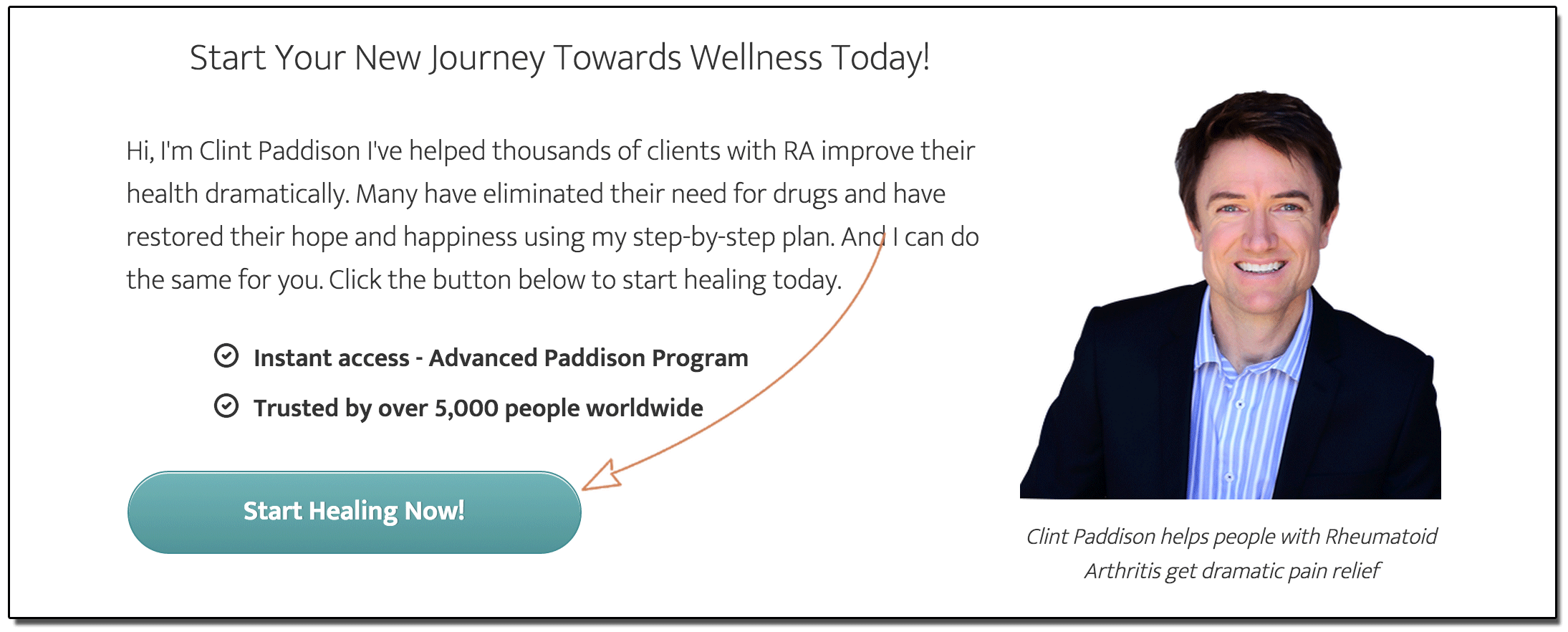https://www.paddisonprogram.com/forum
PART 1 – What Stress Does To Our Body
In this episode I have taken on of the threads on stress and Rheumatoid Arthritis from our Rheumatoid Arthritis Coaching Forum and posted it here so you can learn how stress affects RA and what the science says on this topic.
Quick Summary: You’ll see in the content below that it is clear that stress plays a very large role in the outcome of RA. It directly effects the severity of RA symptoms, even when the amount of stress is small. Stress and RA systems are intertwined so that more stress can create more symptoms which, in turn, creates more stress. Interpersonal stress has been well studied and it’s effects on RA are dramatic. The mechanisms behind RA increasing with stress are likely to be both hormone-related and through changes to the gut wall integrity. Interpersonal stress is very negative on RA symptoms and persons with RA are hypersensitive to interpersonal conflict, thus making personal relationships of critical importance to disease management. Meditation and calming practices are also helpful, though benefits are only seen several months after persistent practice. Writing down stressful events and talking about stressful events are both very helpful in managing symptoms.
LISTEN TO THIS EPISODE HERE
[powerpress]
The cause of RA can be explained through BLAAME – Bacteria, Leaky Gut, Acidosis, Acid (gastric), Mucosal Lining and Enzymes.
Of these, Stress is extremely detrimental on two of them in particular:
Stress Creates Leaky Gut
Stress-induction leads to a more permeable intestinal wall which is intended to facilitate an increase in the availability of water, sodium, and energy-rich substances necessary to meet the increased metabolic demand induced by the stressor. Modern life-style factors, such as long-term psychosocial stress and components of our “Western” diet add constant stress and further compromise intestinal barrier function, resulting in endotoxemia, low-grade inflammation, and its related diseases. [Reference]
Stress Lowers Bacterial Levels
Researchers examined the relationship between stress levels and gut flora levels in 23 healthy undergraduate students over two 1-week periods: during the beginning of semester (low-stress baseline condition) and during the first week of exams (high-stress condition). Students also completed questionnaires measuring perceived levels of stress, gastrointestinal symptoms and diet. Saliva and poo samples were used to find that the intestinal flora of the students was approximated 50% less on exam day and then stayed low after the exam for another 5 days! The authors wrote “non-extreme, ‘every day’ stress events affect the integrity of the indigenous gastrointestinal microflora of humans’. [Reference]
Stress And RA Overview
So what do we see with actually RA sufferers in practice? Well, we know that stress is one of the important risk factors in actually triggering RA to occur [Reference]. Even minor stress is associated with an increase in disease activity in RA patients [Reference]. A longitudinal study over a period of 5 years showed that patients with RA who had a higher daily stress level at baseline had a poorer outcome and significantly more bony erosions after 5 years [Reference]
Viscous Cycle of Stress and RA
With RA and stress, there is a phenomenon of a viscous cycle (or a “psychophysiological feedback loop”) where the hypothesis is that both emotional stress levels and RA disease activity each served as a driving force. Consequently, as emotional stress levels increased, RA symptoms intensified and, likewise, as RA symptoms intensified, emotional stress levels increased further. The study concluded that by achieving a reduction in emotional stress levels would “perhaps, decrease the incidence and /or severity of RA disease activity”. [Reference]
Interpersonal Stress Is The Worst
One area of stress that has been well researched is the area of interpersonal stress, resulting from arguments, debates or disagreements with other people. This interpersonal stress appears to be associated with increases in disease activity among RA patients [Reference] Making the situation even more delicate is the ease at which RA sufferers can become stressed through these occurances. For RA patients the occurrence of interpersonal conflict accounts for more than twice the increase in depression markers than osteoarthritis sufferers. Scientists believe certain immune-stimulating hormones are at play with RA sufferers, meaning that these negative interactions with other people affect them substantially more both psychologically and physiologically. [Reference]
PART 2 – What The Science Says To Do About Stress
Thus, our responsibility to ourselves to get well is to minimise ongoing stress.
Get Support
Three other studies showed that social support from others can improve the outcome of RA. [Reference, Reference, Reference] potentially because the support provides a ‘stress-buffering’ function [Reference]. So it is imperative to surround yourself with quality people who uphold the highest view of you, your efforts and your expectations with this condition.
However, the reverse is also true. RA patients who reported to have the least amount of support and and a greater degree of problematic interactions with others were those that experienced the highest level of symptoms. [Reference]
I recommend the Paddison Program Forum as the best place to be on the planet for Reversing RA Symptoms in a supportive, interective, problem-solving environment. It simply makes healing faster and enjoyable. Existing Advanced Package customers should join via the Advanced Package login page.
The Relationship You Have With Your Spouse Is Critical
These two short paragraphs above could entirely dictate your future with this disease. Do not underestimate the power of influence of those who are closest to you – especially your spouse. A study was conducted to find the effects of interpersonal stress on disease activity for married women with rheumatoid arthritis (RA) who differ in the quality of their relationships with their spouses. Here are some fascinating results:
– women with better spousal relationships did not show increases in disease activity following an episode of interpersonal stress.
– patients taking low-dose prednisone showed greater reactivity to stress than patients not currently using glucocorticoid treatment. This is another reason why prednisone is such a terrible option as a long-term treatment for RA (since prednisone also causes Leaky Gut and depletes Vitamin D thus contributing to the osteoporosis)
Thus, a strong, healthy relationship between husband and wife can lower vulnerability to stressors which, in turn, can keep RA steady. [Reference]
So what if you don’t have a partner or if your relationship isn’t supportive? Let’s look at some more things you can do right away.
Meditation
Meditation to calm the mind and reduce stress can be very beneficial in re-establishing the proper functioning of your digestion and thus maintaining health. By reducing stress in the mind we calm the whole nervous system and allow a more peaceful, healing environment in the body.
As a side benefit of meditation, I also find it the most likely medium in which my greatest ideas or eureka moments will occur, whilst I am sitting and thinking about nothing. The gentle ideas that pop into my head during meditation are often the perfect solutions to things that my conscious mind has dwelled on endlessly. It was during meditation or gratitude moments that I have had gentle little promptings come up that have helped me the most to move forward with my healing. The aim though, of course, is just to gently let thoughts go! My point is that even the thoughts you do get during meditation seem to be of a higher quality of the usual meaningless chatter.
It has been shown that meditation is beneficial in reducing joint tenderness. The amount of benefit is greatest for those in the most depressive emotional states [Reference]. Further research on meditation in RA shows positive results, but only after a few months is the effect noticeable when compared to a control (non-meditating) group. [Reference]
Inside our Rheumatoid Arthritis Coaching Forum we have a Yoga Nidra Relaxation Course by Melissa here and Meditation Training by Ellen here
Writing About Your RA Challenges Lowers Disease Activity
So how can we reduce stress? Stress and RA
Research has demonstrated that writing about emotionally traumatic experiences has a surprisingly beneficial effect on symptom reports, well-being, and health care use in healthy individuals. So simply documenting your progress in your personal journal here in the forum [or some other way if you’re not in the forum] and sharing your ups and downs can even improve symptoms.
[Reference]
Talking About Stressful Experiences Lowers Disease Activity
In a recorded trial, patients were randomly assigned to talk privately about stressful events. Although this often put them into a negative mood (as the stressful events were discussed), those that did discuss their stressors had less affective disturbance and better physical functioning in daily activities after 3 months. In fact, those who experienced larger increases in negative mood after talking demonstrated improvements in the condition of their joints. The conclusion drawn is that among RA patients, verbal disclosure and emotional processing of stressful life events induces an immediate negative mood – followed by improvement in their Rheumatoid Arthritis. [Reference]
Support Group Lowers Disease Activity
Another study showed that having a stress management support group for 10 weeks, followed by a 15 month maintenance phase was powerful in disease outcome. In fact “beneficial effects were still detectable at the 15-month followup evaluation” so we need to have a support group and we will have beneficial outcomes to our RA so just by getting the support and attention and care from the Paddison Program forum you’re benefiting your health for the future – and if you’re not a Paddison Program forum member I strongly encourage you to join or you should form your own supportive group outside where you can get ongoing help, love, support and guidance like you do in here in the forum [Reference]
PART 3 – What I Did (And Sometimes Still Do) About My Stress
What I Did To Minimise Stress And Reverse My Rheumatoid Arthritis Symptoms
The steps that I took to minimise stress in my life were the following:
– Bikram Yoga on a daily basis (this also improved my joints tremendously, thus relieving my concerns about my future.)
– Other cardiovascular exercise (even walking helps, but for for serious joint pain relief I had to elevate my heart rate each day to a point of sweating for 30min or more)
– Go towards nature. Beach or mountains or a park. Nature is calming and the calming effects happen quickly.
– Communicated regularly and openly with my wife Melissa about all the detail with my condition (sometimes too much, but she was my rock!)
– Meditate a little here and there
– Write down everything so I ‘get it out’.
– Scream. Punch things. Kick things. Yep, sometimes you’ve just got to get it out.
– Laugh as often as possible. I’m always at comedy clubs so I get this easily – but make a point of enjoying some humour
– Follow the program that I strongly recommend to everyone with RA, since stress means that the digestive process is weak – so we need to have easy to digest foods, rich with enzymes, to take pressure off our weakened digestive system.
SUMMARY
It is clear that stress plays a very large role in the outcome of RA. It directly effects the severity of RA symptoms, even when the amount of stress is small. Stress and RA systems are intertwined so that more stress can create more symptoms which, in turn, creates more stress. Interpersonal stress has been well studied and it’s effects on RA are dramatic. The mechanisms behind RA increasing with stress are likely to be both hormone-related and through changes to the gut wall integrity. Interpersonal stress is very negative on RA symptoms and persons with RA are hypersensitive to interpersonal conflict, thus making personal relationships of critical importance to disease management. Meditation and calming practices are also helpful, though benefits are only seen several months after persistent practice. Writing down stressful events and talking about stressful events are both very helpful in managing symptoms.


